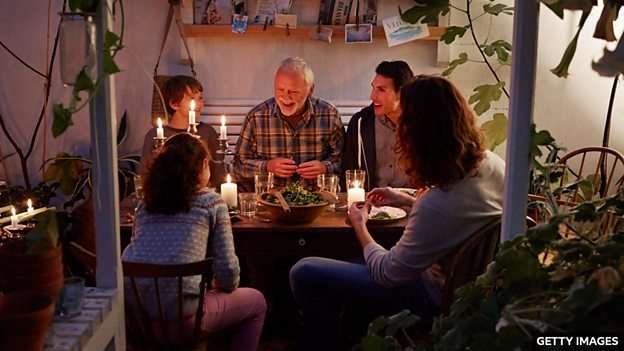数千年来,共同就餐是人类之间建立纽带的方式。作为狩猎采集者,在危机四伏的自然环境中一起捕猎、准备食物和烹饪能够为彼此提供保护。而在现代社会中,人们虽然已经不需要通过这些方式来保护自身,却依然保持了共同就餐的习惯。本文探讨与他人一起就餐有哪些好处。
词汇:social eating 集体用餐
"Dinner's ready!" Do you recognise that familiar call for everyone to gather round the table and tuck in? Whether it's a takeaway with friends or a family get-together during holiday seasons, humans have been eating together for thousands of years. But why?
The discovery of fire may have kickstarted communal eating for our hunter-gatherer ancestors, according to primatologist Richard Wrangham. Cooking a meal all those years ago required a social group – you needed someone to hunt the food, someone to protect the food from thieves or predators, and of course, someone to cook. And once enjoying the feast, evolutionary psychologist Robin Dunbar speculates that the fire's bright light may have given the humans longer nights and provided great opportunities for bonding over food.
But modern humans don't face the same threats as we used to – we can cook and eat a meal by ourselves. So why should we still make group meals a ritual? In Dunbar's 2017 study 'Breaking Bread: the Functions of Social Eating', they found communal eating increased feelings of wellbeing and connectedness with the community. Despite this, the study found a third of weekday evening meals in the UK are eaten in isolation – the main cause being busy work schedules.
Today's reality is that having meals together can be difficult. Time management, fussy eaters, and family tensions are all things that can get in the way. But, in an article about overthinking family meals, Susannah Ayre and colleagues write 'Five tips to ease the pressure', including dropping the need for perfection. "There is no shame in reheating a frozen meal" or "eating on a picnic rug in the living room".
Sharing meals may look different today than it did for our ancestors, but the essence stays the same: food is more than just fuel. It can be a way to connect, share stories and strengthen bonds.
词汇表
gather round 聚到一起
tuck in 痛快地吃
takeaway 外卖
get-together 团聚,聚会
communal 群体的,集体的
hunter-gatherer 狩猎采集者
feast 盛宴
bond 建立纽带
ritual 仪式
wellbeing 身心健康
connectedness 连结性,联系感
isolation 独立,孤立
fussy 挑剔的,难以取悦的
tension 矛盾,紧张的关系
reheat 再次加热
picnic 野餐
测验与练习
1. 阅读课文并回答问题。
1. When does Richard Wrangham think communal eating started?
2. How is the bright light of a fire related to social bonding over food?
3. True or False? Most evening meals in the UK are eaten by people by themselves.
4. What is one tip given to ease the pressure of family meals?
5. How can food be more than just fuel?
2. 选择意思恰当的单词或词组来完成下列句子。
1. Morning coffee is a daily _______ for a lot of people.
ritual picnic isolation wellbeing
2. Don't be so _______! You've got to eat your vegetables.
feast fussy communal tense
3. We _______ the campfire to share stories late into the night.
got together gathered round connected isolated
4. Everyone _______ as soon as the food was served.
hunted bonding reheated tucked in
5. We're planning a small _______ for Jenny's birthday next weekend.
gotten-together got together get together get-together
答案
1. 阅读课文并回答问题。
1. When does Richard Wrangham think communal eating started?
Richard Wrangham thinks communal eating started when our hunter-gatherer ancestors discovered fire.
2. How could the bright light of a fire be related to social bonding?
Robin Dunbar speculates that the fire's bright light may have given early humans longer nights and provided great opportunities for bonding over food.
3. True or False? Most evening meals in the UK are eaten by people by themselves.
False. Only a third of weekday evening meals in the UK are eaten in isolation, according to Dunbar's 2017 study.
4. What is one tip given to ease the pressure of family meals?
One tip to ease the pressure is dropping the need for perfection.
5. How can food be more than just fuel?
Food can be a way to connect, share stories and strengthen bonds.
2. 选择意思恰当的单词或词组来完成下列句子。
1. Morning coffee is a daily ritual for a lot of people.
2. Don't be so fussy! You've got to eat your vegetables.
3. We gathered round the campfire to share stories late into the night.
4. Everyone tucked in as soon as the food was served.
5. We're planning a small get-together for Jenny's birthday next weekend.

